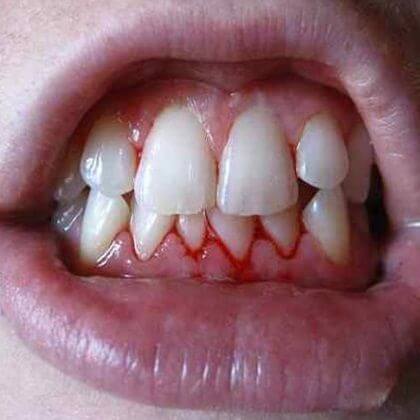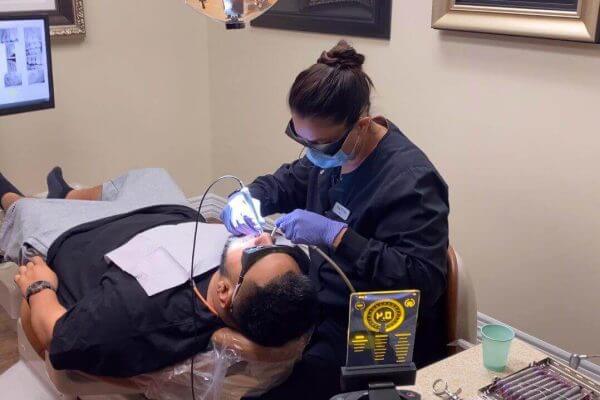Gum Disease Treatment Options
A skilled dentist does more than fill cavities. They treat many types of oral conditions, one of which is gum disease. Dr. Hauser has treated thousands of patients over 20 years, and experience is very important when choosing a dentist that knows the correct signs of gum disease.
This saves his patients money through proper diagnosis and treatment. When patients really care about their oral health and visit Lakefront Family Dentistry twice a year for a checkup, it’s much easier to catch early gum disease—before it turns into gingivitis and then periodontitis.
Don’t Let Gum Disease Become Gingivitis or Periodontitis
Periodontitis affects the gums and even bone more than gum disease. Therefore, catching gum disease early means patients keep money in their bank account and their oral health is better for years to come. Gum disease is reversible, and the treatment is simple.
But waiting to come in for a checkup might mean more costly treatment and deeper root planing treatment well-below the gum line. Even though Dr. Hauser’s patients are numb for periodontitis treatment, it’s much more in-depth and causes more discomfort and healing time than gum disease treatment.
Flossing and Brushing is Not Enough
Although patients floss and brush at least two to three times per day with a great Sonicare toothbrush, genetics plays a role in a person’s oral health. Even if a non-smoker takes great care of their teeth and gums, decay can still be present.
A person’s saliva, or even a lack thereof, can have chemicals that do not help reduce plaque. If this happens, tartar builds up, and gum disease can begin without a significant visual picture to someone who does not know the signs.
Trust your dentist to take good care of you and your family. Dr. Hauser answers all his patients’ questions so they are comfortable with the care and costs of every single treatment. Lakefront Family Dentistry accepts PPO insurance, and if that’s not an option, Dr. Hauser offers a cash discount for other patients.
Gum Disease Symptoms
If teeth begin to wiggle and it’s painful or sensitive to chew food, it could be a sign of gum disease or advanced stage oral disease. Gums should not bleed every day or be tender to the touch. Take notice if teeth appear to be “longer” in height than you remember. This means gums are receding, which is an indicative sign of disease.
Take notice of your oral condition. You are the one person who is close enough to it every single day and should manage it to the best of your ability. For the rest, Dr. Hauser is here to help take the worry out of that beautiful smile.
Gum Disease Risk Factors
Noticing gum erosion, bleeding gums and sensitivity is a sign the disease is present. Additionally, certain types of people or conditions increase one’s risk of getting gum disease, as follows:
- Smokers
- Menstruation
- Pre-Menopausal women
- Post-menopausal women
- Hormone imbalances in men and women
- Diabetes
- Certain types of medication
- Genetics
As you can see there are many factors, some of which cannot be controlled, that will cause millions to have gum disease over their lifetime. It’s a matter of how you handle your oral health to prevent these conditions and come in for a bi-annual checkup with Lakefront Family Dentistry so they can do everything you need to improve your health for years to come.
Call Dr. Hauser, a Qualified Gum Disease Dentist, at (951) 244-9495 for a Consultation or Request Appointment Online to See if You have Gum Disease and Discuss a Treatment Plan to Reverse the Condition Today.





